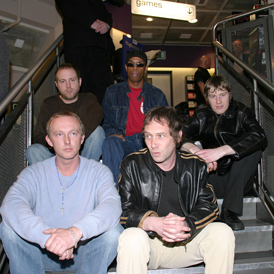Costello latest star to hit wrong note with record company
Elvis Costello tells fans not to buy his latest box set because his record company are selling it for a staggering £213. Channel 4 News recalls other spats between artists and labels.

In a blog posting on his Universal-owned website, Elvis Costello brands the price of the new box set as “an elaborate hoax” and goes on to recommend that fans instead buy Ambassador Of Jazz, which contains 10 albums by Louis Armstrong. (It is worth noting that the Armstrong box set is also released by Universal Music.)
In the post Steal This Record, Costello notes the price for the Armstrong collection is about US$150 (£96) – cheaper than his, which clocks in at almost $333 (£213) – before adding: “frankly, the music is vastly superior.”
His own box set, The Return of the Spectacular Spinning Songbook, is being released this month by Universal Music as a limited edition of 1,500 and it includes a CD, DVD, vinyl EP and coffee table book. The company is hoping to net £300,000 from the sales.
Costello’s blog post reads: “There was a time when the release of a new title by your favourite record artist was a cause for excitement and rejoicing but sadly no more.
Unfortunately, we find ourselves unable to recommend this lovely item to you as the price appears to either be a misprint or a satire. Blog post on Elvis Costello’s website
“Unfortunately, we at www.elviscostello.com find ourselves unable to recommend this lovely item to you as the price appears to be either a misprint or a satire.
“All our attempts to have this number revised have been fruitless but rather than detain you with tedious arguments about morality, panache and book-keeping – when there are really bigger fish to filet these days – we are taking the following unusual step.”
Costello is not the only musician to publicly criticise or challenge their record label, and when artist defies label, there is usually only one winner (see Prince, George Michael, Pink Floyd).
In recent years, artists have accused labels of “unfair working conditions”, labels have branded musicians “greedy” and legal wrangles have even left bands on the dole. Channel 4 News takes a look at what happens when musicians and record companies stop singing from the same hymn sheet.

Courtney Love
A seeming ever-present in court, Hole singer and wife of late Nirvana frontman, Kurt Cobain, Courtney Love’s apparent loathing of the record company industry inspired her to counter-sue Universal, which took action against her in 2001 for failing to deliver the five albums promised.
She vowed to expose what she called the “repressive and unfair working conditions” of the recording industry, branding the company “unconscionable and unlawful”.
“Artists who have generated billions of dollars for the music industry die broke and uncared for by the business they made wealthy,” Love said at the time.
“I’m driven by the misfortune of other artists who don’t have my privilege and ability.”
She vowed never to settle with the company and her actions inspired dozens of other artists to follow suit against their record companies, believing that Love’s battle could force legislative changes that would improve musicians’ working conditions forever.
Love settled with Universal and was released her from her record contract with a multi-million dollar pay-off. The deal involved Love giving Universal permission to release Nirvana material.

Linkin Park
The rap-rock band Linkin Park, famed for their angst-ridden, teenage-friendly music, did not take kindly to a request from their record label Warner Music to play a gig at the New York Stock Exchange to celebrate its planned $750 million initial public stock offering in 2005.
The band said that the invitation to play at the heart of New York’s banking district “just exemplifies how out of touch the ownership of the Warner Music Group is with our band.
“It doesn’t make any sense to us why we would play a show at the New York Stock Exchange. I don’t know what was going through their minds.”
The band went on to say that it was exploring ways to sever its contract with Warner, which required it to produce four more albums.
“We want off the Warner Music Group,” the band said.
Linkin Park have since released three more albums with Warner.

Radiohead
The critically-acclaimed British band fell out with label EMI in 2007 because the company would not agree to a deal worth £10 million, according to reports at the time.
The company had offered to shell out £3m to renegotiate the band’s contract, which they found unacceptable. The band parted ways with the label, which made millions of pounds from their early albums, including OK Computer and The Bends.
To compound the issue, EMI publicly criticised the band, saying: “Radiohead were demanding an extraordinary amount of money and we did not believe that our other artists should have to subsidise their gains.”
Radiohead’s seventh album, In Rainbows, was released through the band’s own website months later as a digital download for which fans could pay whatever they liked for it. At least 1.2 million people downloaded it at an average price of £2.90, with Radiohead keeping all the proceeds.

Ocean Colour Scene: The ‘dole-drums’
In the early 1990s, the Birmingham Britpop band fell into dispute with Phonogram over the staggering cost incurred in making their debut album.
The label and band took to the courts to settle their dispute, and the band were left penniless and back on the dole, despite their burgeoning popularity. To compound OCS’s problems, during the legal proceedings, Phonogram prevented the band from playing live until the dispute was resolved.
The band often recall that during their forced hiatus from the music scene, they conceived some of their greatest material.
And when they released their second album, with MCA, four years later, it went to number two in the charts and sold 1.3 million copies.